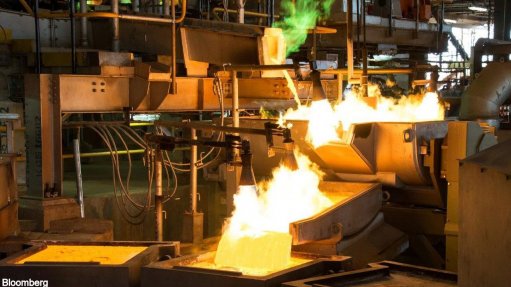On-The-Air (11/07/2014)
Every Friday morning, SAfm’s AMLive’s radio anchor Sakina Kamwendo speaks to Martin Creamer, publishing editor of Engineering News and Mining Weekly. Reported here is this Friday’s At the Coalface transcript:
Kamwendo: 15 000 diamond mineworkers have been cut into De Beers’ new R2.5-billion black economic empowerment deal.
Creamer: Ponahalo is the black economic empowerment partner of De Beers diamond mine in South Africa. What they have done now is that not only the mining will be empowered but also the trading. This is a very important development. You have got 15 000 diamond mineworkers who are now cut into the trading side of it.
We trade about 5-million carats in South Africa a year from the De Beers stable. So, that means that they are going to be part of the valuing, trading and business profits. It is an important step and we see that it is very broad based given those 15 000 employees and also some selected former employees that were also cut into this deal. Then you have got community trusts, disabled trusts and women trusts cut in.
They pride themselves, particularly Manne Dipico, who is head of Ponahalo. You can see the great feeling of endearment that he can actually spread this, and him and Cheryl Carolus wanting to celebrate the broad-based nature of this. We saw the disabled people there as the journalists went in to the Harry Oppenheimer house, which is a fourteen-story building overlooking Kimberley, and you could see the disabled people also involved in cutting and polishing training in the academy.
It was quite a good sight to see and. Dipico, who was the former premier there, a former De Beers worker, as well as a former union leader, is saying they watch them very closely there. The tall fourteen story building overlooks the premiers offices. Dipico says that as a former premier leader he also had all these eyes watching him and they always knew what was going on.
They are also watching where all that money is going. I must say, they seem to be spending it well. Some of the investments so far and there haven’t been many, because the diamond industry went down and this was basically under water for a while, but it is picking up now and there are a lot of smiling faces, because you can see diamond sales moving in the United States and China. They are looking to do more with their money.
Already you find that they have invested in an abalone farm, which is, I think, quite interesting, because you get mineworkers trained in a different area of expertise, but also showing the way they want to spend this money in development and making sure that people are retrained. The broad nature of 15 000 miners cut in not only to the mining activities but to the trading as well.
Kamwendo: In real terms what will they benefit?
Creamer: That is the thing, not much cash has passed yet, because the state of the diamond industry they have had to be patient, but the value is growing. They had their first payout this year. Also, they put their money where their mouth is because they said that they must also invest in Venetia diamond mine.
So, they are thinking children, grandchildren. They are looking long. It is an interesting one, I was happy with the way they are working this, because they are not just, as Dipico says, taking the money and running, they are in there with the new investment as well.
Kamwendo: The new Venetia diamond mine in Limpopo will have driverless trucks as part of an automation drive. We talking mechanisation, now you are talking about driverless trucks.
Creamer: Mechanisation is something people have been talking about with mining, because we need to create knowledge-based miners who get paid more money. Going in to mechanisation in this modern age is like going into fixed line phones when you could be going for cellphones.
People are leaping over mechanisation and going in to the automation. Venetia mine, they are spending R20-billion. This is an incredible investment inside Limpopo and it is a very rich mine. Already there is an opencast mine there, so it is pumping money. It has always been lucrative, now they are taking that cash and they are using it to fund the underground.
They are going underground and when they go underground, they are going to have these loops where there will be automated trucks. Their haulage will be carried by trucks with no people in. That is the new way of doing things, particularly in the mining business, because we know that De Beers used to own the Finsch mine in the Northern Cape and they introduced this automation, even then, which is like a decade ago.
They have taking a learning from that and they are going to put them into this Venetia mine. They say it is not only a question of having driverless trucks there is going to be a lot more technology to put in there. It will only be proven technology, not going to try out anything. There is so much new technology unfolding that they will probably have a lot more then just the driverless trucks.
Kamwendo: I am a bit surprised to see that we are still talking about the migrant labour system, even today. Strong calls are being made for the reform of South Africa’s much-criticised migrant labour system.
Creamer: Yes, 66 years ago when Alan Paton wrote Cry The Beloved Country when you look at page 148 and 149, he only quotes one real-life individual, all the rest is fiction, and that is Sir Ernest Oppenheimer. In there he quotes and he has Sir Ernest saying we must get rid of these dreaded compounds that have blighted Johannesburg.
When we go to the Free State they have villages with people and their families with kids running around. That was February 1948 when that was published. That year the National Party took over there was no ways you where going to have families living together. So, they reinforced this dreaded and very damaging migrant labour system.
We still live with it today. People are now saying AngloGold’s David Noko coming out that we have got to have more frequency. People have got to go home more. We can’t have this 11-shift fortnight with 12 days leave a year, because we have got our people not really living in the far-flung areas and not living in the mining areas, they are caught in between.
We know that this is at the heart of a lot of the turmoil in the mining industry space. Calls to reform the migrant labour system by starting off with better shifts, restructuring the shifts so that people can get home to those far-flung areas more frequently.
Kamwendo: Thanks very much. Martin Creamer is publishing editor of Engineering News and Mining Weekly, he’ll be back with us at the same time next week.
Comments
Press Office
Announcements
What's On
Subscribe to improve your user experience...
Option 1 (equivalent of R125 a month):
Receive a weekly copy of Creamer Media's Engineering News & Mining Weekly magazine
(print copy for those in South Africa and e-magazine for those outside of South Africa)
Receive daily email newsletters
Access to full search results
Access archive of magazine back copies
Access to Projects in Progress
Access to ONE Research Report of your choice in PDF format
Option 2 (equivalent of R375 a month):
All benefits from Option 1
PLUS
Access to Creamer Media's Research Channel Africa for ALL Research Reports, in PDF format, on various industrial and mining sectors
including Electricity; Water; Energy Transition; Hydrogen; Roads, Rail and Ports; Coal; Gold; Platinum; Battery Metals; etc.
Already a subscriber?
Forgotten your password?
Receive weekly copy of Creamer Media's Engineering News & Mining Weekly magazine (print copy for those in South Africa and e-magazine for those outside of South Africa)
➕
Recieve daily email newsletters
➕
Access to full search results
➕
Access archive of magazine back copies
➕
Access to Projects in Progress
➕
Access to ONE Research Report of your choice in PDF format
RESEARCH CHANNEL AFRICA
R4500 (equivalent of R375 a month)
SUBSCRIBEAll benefits from Option 1
➕
Access to Creamer Media's Research Channel Africa for ALL Research Reports on various industrial and mining sectors, in PDF format, including on:
Electricity
➕
Water
➕
Energy Transition
➕
Hydrogen
➕
Roads, Rail and Ports
➕
Coal
➕
Gold
➕
Platinum
➕
Battery Metals
➕
etc.
Receive all benefits from Option 1 or Option 2 delivered to numerous people at your company
➕
Multiple User names and Passwords for simultaneous log-ins
➕
Intranet integration access to all in your organisation



















